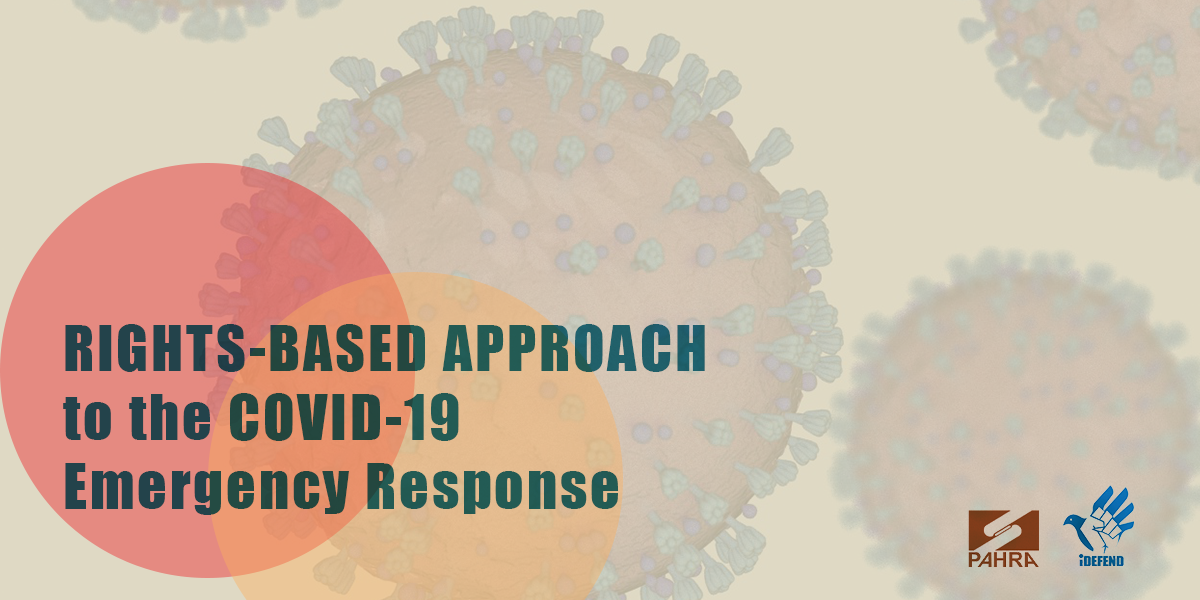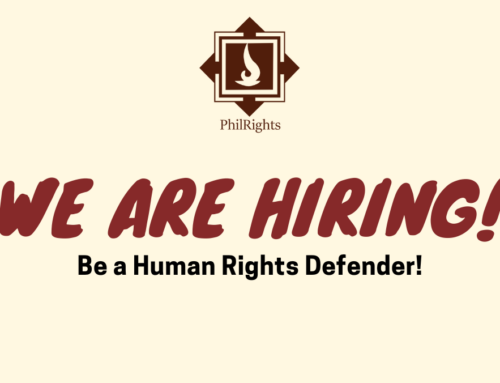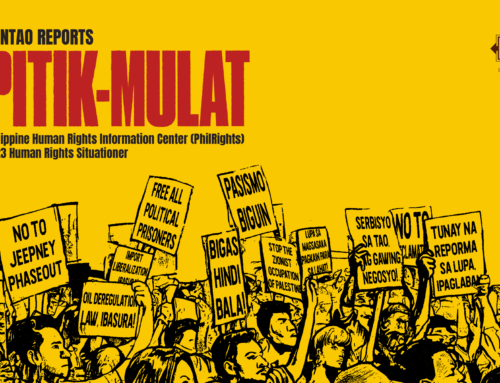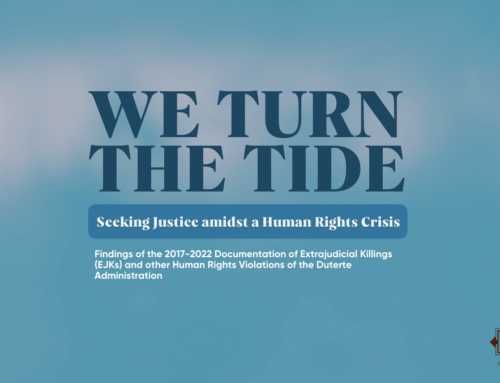Coronavirus image via Wikipedia Commons
by PhilRights Staff
The Department of Health (DOH) has reported 552 cases of COVID-19, with 35 deaths, as of today, March 24. Meanwhile, Congress has granted President Duterte’s request for emergency powers in a special session. All of Luzon remains in lockdown, even as more and more parts of the country are scrambling to put up measures to combat the rise of COVID-19 cases.
As Filipinos continue to grapple with the impact of the pandemic and the government’s emergency response, questions are raised whether our leaders are doing enough to halt the spread of infection and protect the lives and well-being of citizens.
With these issues in mind, the In Defense of Human Rights and Dignity Movement (iDEFEND) and the Philippine Alliance of Human Rights Advocates (PAHRA) held a YouTube discussion among public health experts to raise the issue of a rights-based approach to the COVID-19 pandemic, on Monday, March 23.
The whole discussion can be viewed here
[su_youtube url=”https://www.youtube.com/watch?v=LfUscMeQ5F4″]
Joining Rose Trajano, convenor of iDEFEND and a nurse by profession, are Dr. Nemuel Fajutagana, chairperson of the Board of Trustees of the Medical Action Group (MAG) and a public health educator, Dr. Nymia Pimentel-Simbulan, vice-chancellor of the University of the Philippines-Manila and chairperson of PAHRA, and Dr. Yvonne Eligado Entico, a somatic experiencing practitioner focusing on the treatment of trauma.
Here are the highlights of their discussion.
We need to view the pandemic—and the government response—with a human rights lens
Dr. Pimentel-Simbulan emphasizes the importance of human rights in any situation: “In all instances, the human rights of citizens should continue to be respected, protected, and fulfilled, primarily by the State.” She goes on to say that any action in response to a crisis or emergency situation should center human rights.
She also acknowledges that given the extraordinary circumstances, international human rights laws recognize that certain rights may be derogable or limited, as with the freedom of movement, given the enhanced community quarantine put in place by the government.
This crisis impacts the mental and psychological health of people
Dr. Entico recognizes that with COVID-19 being an entirely new kind of coronavirus, there is a great amount of uncertainty and anxiety in people. Drawing from her work on trauma, she points out that our brains are hardwired to respond to any threat with a fight or flight impulse.
Even as anxiety levels remain high, the fact that people are meant to follow physical distancing protocols can also create a sense of disconnection. “That sense of connection is very important for us. When we’re physically distant, we view this as a threat, so our anxiety levels increase further.”
“The government must have a program to address the mental and psychological health issues caused by the threat of this infection,” she adds.
Dr. Entico also asked everyone to be mindful of signs and symptoms of acute stress reactions. “For instance, sudden feelings of nervousness, difficulty in sleeping, constant worrying, loss of appetite or overeating, these are typical reactions to stress.”
These reactions may be even more heightened for those with existing mental or psychological issues. Those who need to take medication to treat these issues are now faced with the possibility of running out, especially those without the resources to stock up on their prescriptions.
The government should have been more prepared—but wasn’t
“Like many governments, ours did not anticipate the magnitude of the problem we are facing today,” said Dr. Pimentel-Simbulan. This despite the time and resources devoted by the Department of Health to trainings and simulations for this exact situation.
Dr. Fajutagana points out that a triage and isolation approach—crucial to curbing the rise in infections—was not immediately applied. Having been part of preparations for the SARS spread in the past, he identified the importance of a rapid deployment of a triagic response. “If you present with fever, you are automatically directed to a different part of the hospital so that others are not exposed. We separate them immediately; it appears we were not able to do that earlier.”
He views the government’s declaration of policy as belated, which resulted in many private hospitals, in particular, taking in cases of infection, without the right protocol in place. Many of the earlier cases, he says, are people with a travel history from countries with infections. Those who have the resources to travel have access to private hospitals, which, in the early days of the infection, have yet to observe clear policies on containing them. This resulted in many cases of infection among doctors who initially treated them.
COVID-19 is not just a health issue, it is an issue of survival
Key to assessing the government response is understanding how it holistically addresses the many resulting consequences of a health crisis. Dr. Pimentel-Simbulan highlights how the initial measures put in place impacted the right to livelihood of many workers, “especially the daily wage earners, contractuals, those with job orders, people belonging to the informal sector.”
She adds that their current predicament is an illustration of the importance of looking at human rights as being interdependent and interrelated. “If you suspend the freedom of movement by declaring an enhanced quarantine, the rights to education, livelihood, social security, and health are all affected.”
The issue of survival is therefore something to keep in mind through the duration of this crisis, according to the three experts. For those belonging in the vulnerable sectors, the fear and anxiety of not being able to meet their family’s basic needs is an immense psychosocial burden. Dr. Entico says that the government needs to reassure the public that they are ready to respond to the basic needs of people and that programs will be put in place.
We need to strengthen our community response and harness people’s capacities
Dr. Fajutagana says that we are already guided by the Philippine Disaster Risk Reduction and Management Act of 2010 in terms of framing the appropriate response to this crisis. Specifically, he points out the law’s emphasis on empowering the people. “One call here is to develop the capacities of vulnerable and marginalized groups…Without community participation, all of our actions will not succeed.”
With the communities on board, Dr. Fajutagana says that coordination, information management and advocacy are crucial roles for the community to participate in. “If there is no participation in the communities, if people do not support the measures, it is perhaps because they do not know the why.”
Dr. Pimentel-Simbulan laments that the government continues to view the people, especially those in poor communities, as mere beneficiaries of aid from the government and the private sector. “They do not see the power of the people, that they have the skills and the smarts that can be mobilized in facing this emergency.”
A holistic, rights-based response is key
Dr. Fajutagana highlights the importance of looking beyond the crisis as simply a health issue. In terms of assessing the government’s response, as in any disaster, we also need to look at how the related issues are also addressed, such as the impacts on labor, education, and food security. “This all happened in the context of a health disaster, when in fact, it is now a disaster that is affecting all aspects of human life.”
Programming Note:
This YouTube live is the first in a series. Future editions will include a discussion among lawyers on the people’s rights while a lockdown is in place and a discussion on community response by sectoral and community representatives.
iDEFEND and PAHRA have come up with an online reporting tool for human rights violations. If you know of, witnessed, or experienced a human rights violation, in the context of this crisis, please report them here.
We are also raising resources to provide food, medicine, and cash to those most affected by the lockdown. Please visit the iDEFEND Facebook page to find out how you can help.








